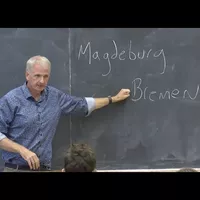Class 5: Vikings, Slavers, Lawgivers: The Kyiv State (5)
One way is continuity.
The continuity of Greece, Rome,
Byzantium and Rus'.
That's one way.
But the other way
is that Rus' is now going
to extend territorially northwards,
this classical civilization,
which had never gotten so far north.
Which is, it's a big part of the history
of the Slavs in general, of Eastern Europe in general,
is that, sure, there are these models
that come from the south,
and now they are going further north,
which brings me to Serhii Plokhy.
So we've been doing this little derby
about whether there are any other lecture classes
on Ukraine in the United States of America.
And so far, this is the only one,
but alert people have pointed out
that there's like, in some provincial university
in Boston area, there is actually one,
but it starts in 1500.
So I'm gonna say that we're still
the only survey lecture class,
because we're five lectures in,
and we're not even close to 1500 yet, right?
So we're still five centuries,
five good centuries away.
But in all seriousness, that class
is taught by Serhii Plokhy,
who is a giant among historians of Ukraine
and Ukrainian historians, and who is the author
of the book that you're reading "Gates of Europe."
And he makes the very important geographical point,
which I hope you've been following,
about how the creation of Ukraine
is not about east and west.
That's a much later point of view.
But about south to north.
It's about south to north, and north to south,
where south to north has to do
with the ancient world, the Greeks,
the Byzantines, the Black Sea,
and the northern coast of the Black Sea,
and things moving up towards Kyiv.
And now the north to south has to do
with the Vikings.
They're moving down the Dnipro River, seeking Byzantium.
And the Kyivan state, you know,
putting it very grandly, is a kind of encounter
of a movement from north to south,
and another movement from south to north,
which meet each other in the city
which already existed and was dominated
at the time by the Khazars.
Okay, so that's gotten us
as far as I thought we could get.
Volodymyr has converted.
The state of Kyivan Rus' has been founded.
A state in the sense that it will be recognized
by other states.
A state in the sense that it belongs
to a monotheistic religion, Christianity,
the Eastern version, which will be recognized
by other Christians.
A state in the sense that it has a language,
a written language, and people who are literate to use it.
A state in the sense that it is building,
and a state in the sense that it's gonna recognize
its subjects, which we're going to talk about.
The weakness of the system,
which I'm just gonna leave you with,
because it's important,
the weakness of this system.
And it's important, also,
when you think about the heritage of Rus'
and people who claim the heritage of Rus' today,
the weakness of the system was the principle of succession,
or the absence of a principle of succession.
There was no idea that, for example,
the oldest son would inherit or anything like that.
Basically, parts of Rus' were given out
to various sons,
and there tended to be lots of sons.
Volodymyr managed to keep seven different districts
under his control by wit,
but it wasn't simple, this business of having sons.
So just to keep this in perspective,
before he married Anna, his most famous wife.
She was not the only one, I'm afraid.
There were about half a dozen others.
But before he married Anna,
the sister of the Byzantine emperor,
he already had 800 concubines.
Presumably, he didn't mention that
to the Byzantine emperor, nor would the Byzantine emperor
have been impressed by the number.
I mean, just for the record,
but (students laughs)
that gives you a sense of the succession problems
that you might have.
There are going to be a lot of male offspring.
And when the father is weak
or the father leaves the scene,
there's gonna be competition.
So next time, we're gonna start talking about law
and how this state recognized its citizens,
and how the state found a particular,
citizen subjects, how the state found
a particular way to do so,
which then becomes a legacy that goes on for centuries.
But in this tradition of law,
the weak point was succession.
The weak point was how the state
actually reproduces itself over time.
We'll talk more about that.
All right. Thanks.
(soothing music)

